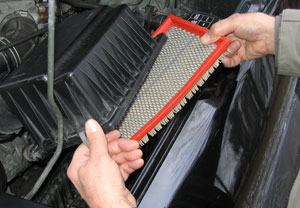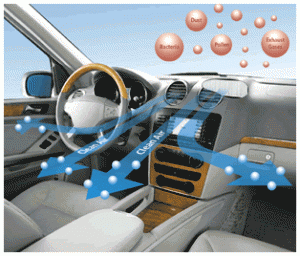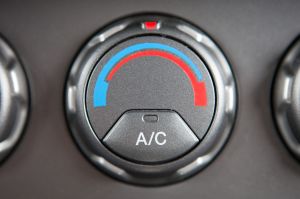 The PCV valve is a small, inexpensive part that does a big job for Denver and our environment here. PCV stands for Positive Crankcase Ventilation. The crankcase is the bottom area of the engine that holds the oil. When the engine’s running, fuel is burned to generate power. Most of the exhaust from combustion goes out through the exhaust system. But some exhaust blows by the pistons and goes into the lower engine, or crankcase.
The PCV valve is a small, inexpensive part that does a big job for Denver and our environment here. PCV stands for Positive Crankcase Ventilation. The crankcase is the bottom area of the engine that holds the oil. When the engine’s running, fuel is burned to generate power. Most of the exhaust from combustion goes out through the exhaust system. But some exhaust blows by the pistons and goes into the lower engine, or crankcase.
These hot gases hold about 70 percent of the fuel that hasn’t burned. This can dilute and contaminate the oil, leading to damaging engine oil sludge. It can also cause engine corrosion. At high speeds, the pressure can build up to the point that gaskets and seals start to leak. Over time, the vented gases will gum up the PCV valve and it won’t work well. That can lead to oil leaks, excessive oil consumption, and reduced fuel economy.
Fortunately, it’s very easy to test the PCV valve, and it’s quick and inexpensive to replace at Express Car Care in Denver. Even so, it’s often overlooked because many drivers don’t know about it. Check in your owner’s manual or ask your service adviser. If this is the first time you’ve heard of a PCV valve, you might be in need of a replacement.
For the price of a couple of burger combo meals at your favorite drive-up window, you can avoid some very expensive deep engine repairs. So don’t hesitate to ask questions about PCV valve replacement, give us a call.

 Have you ever been in your local grocery store and had one of those shopping carts? You know, the one with a messed up wheel that wobbles like crazy. Your cart shakes and pulls to one side and if you’re not careful, it’s clean up on aisle nine.
Have you ever been in your local grocery store and had one of those shopping carts? You know, the one with a messed up wheel that wobbles like crazy. Your cart shakes and pulls to one side and if you’re not careful, it’s clean up on aisle nine. Myths start with a grain of truth and are then built up and circulated around with a lot of imagination and very elastic logic. Unfortunately the internet is a breeding ground for automotive myths. Some car bloggers recall the vehicles of yesteryear and declare their modern descendants to be virtually maintenance free and that anyone who says otherwise is out to rip you off.
Myths start with a grain of truth and are then built up and circulated around with a lot of imagination and very elastic logic. Unfortunately the internet is a breeding ground for automotive myths. Some car bloggers recall the vehicles of yesteryear and declare their modern descendants to be virtually maintenance free and that anyone who says otherwise is out to rip you off. When you take a corner in your car, the outside wheels have a little bit longer distance to cover than the inside wheels. This means that the outside wheels have to turn slightly faster than the inside wheels. This mechanical magic is made possible by the differential.
When you take a corner in your car, the outside wheels have a little bit longer distance to cover than the inside wheels. This means that the outside wheels have to turn slightly faster than the inside wheels. This mechanical magic is made possible by the differential. Last week I was out running errands and my temperature warning light came on – total panic! I pulled over and my car was overheating. After I waited for it to cool down, I went right into my Denver service center to have them take a look. My service adviser at Express Car Care told me my water pump was leaking and needed to be replaced. He said water pumps just wear out and that they need to be replaced, because they have the important task of pumping the coolant that cools the engine while it’s running.
Last week I was out running errands and my temperature warning light came on – total panic! I pulled over and my car was overheating. After I waited for it to cool down, I went right into my Denver service center to have them take a look. My service adviser at Express Car Care told me my water pump was leaking and needed to be replaced. He said water pumps just wear out and that they need to be replaced, because they have the important task of pumping the coolant that cools the engine while it’s running. Every vehicle owner who has taken their car in for an oil change has been told at one time or another that their engine air filter is dirty. These are the steps that go into determining when your engine air filter needs to be changed.
Every vehicle owner who has taken their car in for an oil change has been told at one time or another that their engine air filter is dirty. These are the steps that go into determining when your engine air filter needs to be changed. Question: My car repair shop said I need a new serpentine belt, but I don’t see any cracks in it. Does it really need to be replaced?
Question: My car repair shop said I need a new serpentine belt, but I don’t see any cracks in it. Does it really need to be replaced? Do you ever get musky odors coming from your car’s air vents? It’s a fairly common experience for Denver drivers. Moisture can accumulate in the air conditioning/heating ventilation system allowing mold, mildew, fungus and bacteria to grow.
Do you ever get musky odors coming from your car’s air vents? It’s a fairly common experience for Denver drivers. Moisture can accumulate in the air conditioning/heating ventilation system allowing mold, mildew, fungus and bacteria to grow. Let’s talk about air conditioning service and repair issues today. Most of us in Denver don’t give our air conditioning a second thought – just as long as it’s making cold air. But it’s a complex and expensive system that we should think more about before it starts blowing out hot air.
Let’s talk about air conditioning service and repair issues today. Most of us in Denver don’t give our air conditioning a second thought – just as long as it’s making cold air. But it’s a complex and expensive system that we should think more about before it starts blowing out hot air. Express Car Care Question: I was driving down the freeway in Denver and smoke started coming out of my car. I pulled over and called my husband. I had to be towed to my mechanic. He said my car had overheated. What can I do to prevent this from happening in the future?
Express Car Care Question: I was driving down the freeway in Denver and smoke started coming out of my car. I pulled over and called my husband. I had to be towed to my mechanic. He said my car had overheated. What can I do to prevent this from happening in the future?